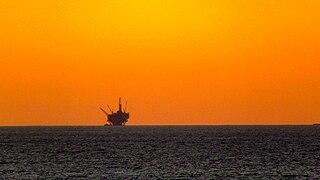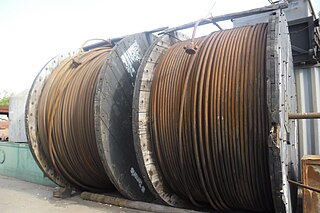
A film crew is a group of people, hired by a production company, for the purpose of producing a film or motion picture. The crew is distinguished from the cast as the cast are understood to be the actors who appear in front of the camera or provide voices for characters in the film. The crew is also separate from the producers as the producers are the ones who own a portion of either the film company or the film's intellectual property rights. A film crew is divided into different departments, each of which specializes in a specific aspect of the production. Film crew positions have evolved over the years, spurred by technological change, but many traditional jobs date from the early 20th century and are common across jurisdictions and film-making cultures.

An oil platform, offshore platform, or offshore drilling rig is a large structure with facilities for well drilling to explore, extract, store, and process petroleum and natural gas which lies in rock formations beneath the seabed. In many cases, the platform contains facilities to house the workforce as well.
A distributed control system (DCS) is a computerised control system for a process or plant usually with a large number of control loops, in which autonomous controllers are distributed throughout the system, but there is central operator supervisory control. This is in contrast to systems that use centralized controllers; either discrete controllers located at a central control room or within a central computer. The DCS concept increases reliability and reduces installation costs by localising control functions near the process plant, with remote monitoring and supervision.

Professional diving is diving where the divers are paid for their work. There are several branches of professional diving, the best known of which is probably commercial diving and its specialised applications, offshore diving, inshore civil engineering diving, marine salvage diving, HAZMAT diving, and ships husbandry diving. There are also applications in scientific research, Marine archaeology, fishing and aquaculture, public service and law enforcement and military service. Any person wishing to become a professional diver normally requires specific training that satisfies any regulatory agencies which have regional or national authority, such as US Occupational Safety and Health Administration, United Kingdom Health and Safety Executive or South African Department of Labour. Due to the dangerous nature of some professional diving operations, specialized equipment such as an on-site hyperbaric chamber and diver-to-surface communication system is often required by law.
Filmmaking is the process of making a film, generally in the sense of films intended for extensive theatrical exhibition. Filmmaking involves a number of discrete stages including an initial story, idea, or commission, through screenwriting, casting, shooting, sound recording and reproduction, editing, and screening the finished product before an audience that may result in a film release and exhibition. Filmmaking takes place in many places around the world in a range of economic, social, and political contexts, and using a variety of technologies and cinematic techniques. Typically, it involves a large number of people, and can take from a few months to several years to complete.

A diving support vessel is a ship that is used as a floating base for professional diving projects.
Dispatchers are communications personnel responsible for receiving and transmitting pure and reliable messages, tracking vehicles and equipment, and recording other important information. A number of organizations, including police and fire departments, emergency medical services, motorcycle couriers, taxicab providers, trucking companies, railroads, and public utility companies, use dispatchers to relay information and coordinate their operations. Essentially, the dispatcher is the "conductor" of the force, and is responsible for the direction of all units within it.

The Armed Forces of Malta is the name given to the combined armed services of Malta. The AFM is a brigade sized organisation consisting of a headquarters and three separate battalions, with minimal air and naval forces. Since Malta is the guardian of the European Union's most southerly border, the AFM has an active role in border control.
Nissan Motor Manufacturing (UK) Ltd, or NMUK, is a car manufacturing plant in Sunderland. It is owned and operated by the European division of Japanese car manufacturer Nissan.

Critical infrastructure protection (CIP) is a concept that relates to the preparedness and response to serious incidents that involve the critical infrastructure of a region or nation.
A theatrical technician, is a person who operates technical equipment and systems in the performing arts and entertainment industry. In contrast to performers, this broad category contains all "unseen" theatrical personnel who practice stagecraft and are responsible for the logistic and production-related aspects of a performance including designers, operators, and supervisors. Many professional designers and technicians consider the diminutive "techie" to be offensive.

The Royal Australian Army Ordnance Corps (RAAOC) is the Corps within the Australian Army concerned with supply and administration, as well as the demolition and disposal of explosives and salvage of battle-damaged equipment. The Corps contains clerks, operator supplies, petroleum operators, parachute riggers and ammunition technicians. Members of the Corps are nicknamed Roaches.
ISO/IEC 27002 is an information security standard published by the International Organization for Standardization (ISO) and by the International Electrotechnical Commission (IEC), titled Information technology – Security techniques – Code of practice for information security controls.
In the Petroleum industry, Integrated operations (IO) refers to the integration of people, disciplines, organizations, work processes and information and communication technology to make smarter decisions. In short, IO is collaboration with focus on production.
Staff management is the management of subordinates in an organization. Often, large organizations have many of these functions performed by a specialist department, such as personnel or human resources, but all line managers are still required to supervise and administer the activities, and ensure the well-being, of the staff that report to them.
Cenovus Energy Inc. is an integrated oil company headquartered in Calgary, Alberta.
Helix Energy Solutions Inc., known as Cal Dive International prior to 2006, is an American oil and gas services company headquartered in Houston, Texas. The company is a global provider of offshore services in well intervention and ROV operations of new and existing oil and gas fields.
Modular Mining (Modular), headquartered in Tucson, Arizona, U.S.A., is a privately held company that develops, manufactures, markets, and services mining equipment management systems. Modular's DISPATCH Fleet Management System is available in eight languages, and is currently running at more than 200 active mine sites; among these are nine of the ten highest-producing surface mines in the world.

GE Oil & Gas was a subsidiary of the American multinational conglomerate corporation General Electric that is now part of Baker Hughes, a GE company. Headquartered in London, United Kingdom, the company supplies equipment for the global oil and gas industry, used in applications across all segments of the oil and gas value chain, including drilling, subsea and offshore, onshore, LNG, distributed gas, pipeline and storage, refinery and petrochemical.

A diving team is a group of people who conduct a diving operation. A characteristic of professional diving is the specification for minimum personnel for the diving support team. This typically specifies the minimum number of support team members and their appointed responsibilities in the team based on the circumstances and mode of diving, and the minimum qualifications for specified members of the diving support team. The minimum team requirements may be specified by regulation or code of practice. Specific appointments within a dive team for which competences are specified and registration may be required are listed below.













